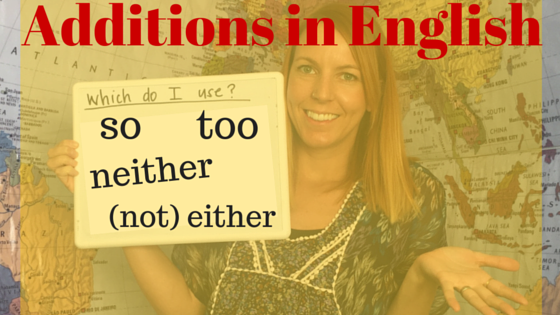
So, Too, Neither, Either: Additions and Agreeing in English
Hello and welcome to English Outside the Box’s official new look. What do you think?
It’s been a little quiet around here (sincerest apologies) because I’ve been waiting to upload this newest “5 Minute English” post on the new and improved website and blog. I would love to invite you to have a look around the new website before you continue with the lesson, and let me know what you think in the comments below!
Alright so let’s talk a little bit about how to agree in English. What if I were to tell you, “I love my new site!”, and you agreed. What would you say? How would you respond?
I’d like to ask you the same question, what would you say and how would you respond if you agreed to this, “I don’t like bacon.”
Would you responses be the same, if you agreed with both?
HOPEFULLY, you answered “no” because your answers should not be the same, even if you agree with both of the statements.
A quick review before our 5 Minute English lesson today is this:
- to agree with affirmative statements (statements without a ‘negative’ word), you use the words “so” and “too”
- [I love my new site] → So do I. I do too.
- to agree with negative statements (statements with “not”, “never”, etc..) you use the words “neither” and “(not) either”
- [I don’t like bacon]→ Neither do I. I do not either
Of course there is A LOT more to learn regarding this grammar topic, additions in English, which is why I made a video lesson especially for you.Watch this week’s 5 minute English video, and review the ways to agree in English. Immediately following the video is more review, a bonus video, and practice sentences and examples.
I hope you were taking notes, but just in case let’s review some of the main ideas here.
As you read above and saw in the video, “so” and “too” are used for affirmative statements, and “neither” and “(not) either” are used for negative statements. Some of the other main differences are:
- “so” and “neither” go in the beginning of the sentence, and they force inversion. This means the auxiliary verb is going to come before the subject. (ex: So do I. Neither do I.)
- “too” and “(not) either” go at the end of the sentence and they follow the normal statement order: subject + (auxiliary) verb. (ex: I do too. I do not either.)
- the same auxiliary verb used in the main statement is going to be used in the addition. So if the main sentence has an auxiliary verb “to be”, “has/have/had” (in the perfect tenses), modals (can, should, etc..), or the future tense (will), then these will be used in the addition statements.
- EXAMPLES:
- 1) I should study today. → So should I. I should too. (the modal: should is the auxiliary in the main statement and used in the addition)
- 2) I won’t call her. → Neither will I. I won’t either. (the future tense uses the auxiliary “will” in the main statement, and it’s used in the addition)
- 3) John is so nice. → So is Mary. Mary is too. (the main verb is the auxiliary verb “be” in the main sentence, so this is repeated in the addition as well).
- EXAMPLES:
- if there are no auxiliaries in the main statement, then you use the auxiliary “do/does/did”
- EXAMPLE
- We danced so much last night! → So did we! We did too! (there is no auxiliary in the main sentence, just the main verb “dance”, so the addition uses the auxiliary “did” (past tense of “do”)
- EXAMPLE
- there is one more, even shorter, way to agree in English and that is by adding “me too” for affirmative statements and “me neither” for negative statements.
Do you have any questions yet? If you do, let me know in the comments and I’ll help you out!
Don’t make the common mistake that many learners do when trying to make additions in English. Avoid that mistake by watching the bonus video.
Get it here:
Practice makes perfect, let’s do this!
Read the following sentences, and write the correct addition with both possibilities. (Use the subject “I”)
*see answers below*
EX: 1) I don’t feel well. → Neither do I. I don’t either.
- I can’t go the movies tonight. → _______________________________
- I shouldn’t eat that other piece of cake. → _________________________
- I try to travel every year to a new place. → _________________________
- I hadn’t met him before yesterday. → ____________________________
- I had a horse as a child. → ____________________________________
- I hate being cold! → ________________________________________
- I could help you. → ________________________________________
- I don’t eat meat. → ________________________________________
Don’t forget to check your answers below, and feel free to write your answers in the comments and/or the questions you had the most difficulty with.
Is there anything you had difficulty understanding today? Can you create some of your own examples in the comments below? Write some affirmative and negative sentences for others to reply to also.
Good luck and…
HAPPY STUDYING! ♥
Did you like what you read today? Do you know someone learning English? Please share this article with them, it’s easy and you can use the share buttons below. Thank you so much!
xo,
Jennifer
Answers to the practice questions above:
Neither can I. I can’t either.
Neither should I. I shouldn’t either.
So do I. I do too.
Neither had I. I hadn’t either
So did I. I did too.
So do I. I do too.
So could I. I could too.
Neither do I. I don’t either.
The Conversation Club will provide you with 6 group conversation calls to practice with a real teacher and a group message community to connect with other members.
You will also get weekly English lessons to help your vocabulary, listening, reading, pronunciation, and more!
Try the Club for 1 week, free! Join the 1-week free trial here.
